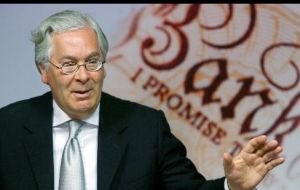MercoPress. South Atlantic News Agency
Bank of England anticipates slow protracted recovery
 Bank of England Governor Mervyn King
Bank of England Governor Mervyn King The Bank of England says that the UK economic recovery is likely to be slow and protracted. The Bank has cut its growth forecast over the next two years and raised its estimate for inflation since February.
It appears to be gloomier than the government, which has forecast a decline in GDP of about 3.5% this year.
The Bank is also more pessimistic about how quickly growth will recover to normal levels, but says there is more uncertainty than usual in its forecast.
“The prospects for economic growth remain unusually uncertain, reflecting the exceptional economic and financial factors affecting the outlook,” the Bank said in its latest quarterly inflation report.
The Bank has not provided a single forecast for economic growth, but its central projection appears to be for a decline of about 3.9% this year and growth of about 1% in 2010.
The bank's gloomy outlook hurt sterling, which fell to $1.5180 against the dollar from $1.5315 before the report was released.
Bank of England Governor Mervyn King said that the economy would take time to heal.
“There are pretty solid reasons for supposing that there will be a recovery next year, but also pretty solid reasons for questioning if that will be sustained” Mr King said.
“But in the light of the state of balance sheets particularly in the financial sector, the committee judges that the risks are weighted towards a relatively slow and protracted recovery.” He said that the timing and strength of the recovery was “highly uncertain”.
Mr King said he saw some reasons for optimism and the pace of economic decline had moderated. He also said that government plans to stimulate the economy and the weak pound would help.
But he was also cautious and said problems in the banking sector had not yet been fully resolved.
The Bank forecast that inflation should fall to around 0.5% by the end of this year before picking up to around 1.2% in two years' time, below the Bank's target rate of 2%.
Mr King said that said it was too early to ascertain whether the Bank's new policy of quantitative easing was successful but said he had not been disappointed by its effects.
With interest rates as low as they can go, the Bank has been pumping money into the banking system through quantitative easing to stimulate the economy.
The process involves the Bank effectively printing money to buy government and corporate bonds.
“It will take 6-9 months I think before we see more evidence,” Mr King said.
Analysts said the inflation report indicated that the Bank's interest rates would likely remain at 0.5% until well into 2010. (BBC).-




Top Comments
Disclaimer & comment rulesCommenting for this story is now closed.
If you have a Facebook account, become a fan and comment on our Facebook Page!